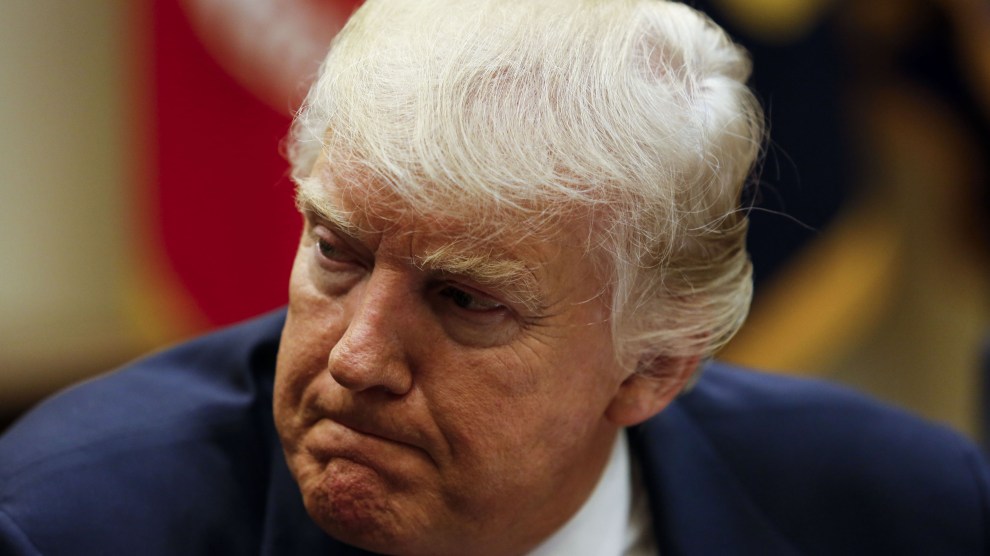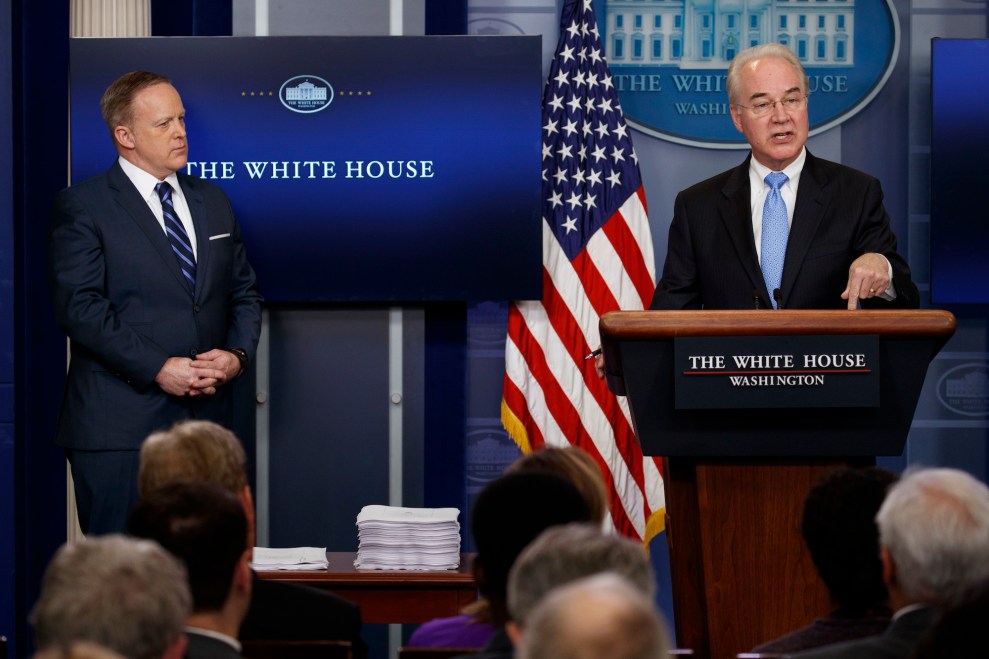
Aude Guerrucci/AP
After the GOP’s Obamacare replacement was revealed on Monday night, President Donald Trump tweeted, “Our wonderful new Healthcare Bill is now out for review and negotiation. ObamaCare is a complete and total disaster – is imploding fast!” House Speaker Paul Ryan (R-Wis.) has guaranteed that the bill, dubbed the American Health Care Act, will have enough support to pass the House.
But in the days that followed, the legislation has faced a growing backlash. Republican politicians, conservative activists and advocacy groups, right-leaning media outlets, health industry groups, and other key stakeholders have stepped forward to voice a variety of concerns. Here’s what they’re saying. We’ll keep this list updated as more reactions come in.
GOP senators who think Trumpcare would harm Medicaid recipients
One of the most significant, and controversial, parts of Obamacare was a provision enabling states to greatly expand Medicaid coverage for poor residents. In the 31 states that opted to expand Medicaid, anyone earning less than 138 percent of the federal poverty level is eligible for Medicaid. But under Monday’s version of the legislation, enrollment would freeze on January 1, 2020: After that, Americans in those 31 states would no longer be eligible to sign up for Medicaid under the Obamacare conditions.
- Four Republican senators from states that expanded Medicaid—Rob Portman (Ohio), Shelley Moore Capito (W. Va.), Cory Gardner (Colo.) and Lisa Murkowski (Alaska)—penned a letter to Senate Majority leader Mitch McConnell (R-Ky.) shortly before the latest version of the bill was released Monday expressing concern that an earlier draft of the replacement “does not provide stability and certainty for individuals and families in Medicaid expansion programs.” While the senators support replacing Obamacare, they say they won’t vote for “a plan that does not include stability for Medicaid expansion populations or flexibility for states.” There’s no indication that Monday’s version of the bill addressed their concerns. Senate Republicans can only afford to lose three votes—four would prevent the bill’s passage unless a Democrat votes for it.
We need to protect Medicaid expansion populations & provide more flexibility for states:https://t.co/LeTYvlw0H8
— Rob Portman (@senrobportman) March 6, 2017
-
Susan Collins, a moderate Republican from Maine, told Katie Couric that she “has a lot of concerns” about the bill—particularly the estimates that 6 to 10 million people could lose their health insurance. Collins objected to the roll-back of Medicaid expansion and also warned that the bill could increase health care costs for seniors.
In addition, Collins opposed to a provision in the bill defunding Planned Parenthood. (Under Obamacare, Planned Parenthood can accept Medicaid funding for non-abortion procedures.) “In my state, Planned Parenthood provides essential health care services to more than 10,000 people,” she said. “Where are those people going to go?” Murkowski has made similar arguments.
GOP lawmakers who think Trumpcare is too close to Obamacare
Many more Republican lawmakers have criticized the GOP bill for not going far enough to dismantle the Affordable Care Act. They see the new legislation as a betrayal Republicans’ promises to repeal Obamacare altogether.
- The House Freedom Caucus—a group of about three dozen conservative members of Congress—blasted the replacement bill for being another “entitlement program” that offers refundable tax credits to poor Americans. “This is Obamacare by a different form,” said former Freedom Caucus Chairman Jim Jordan (R-Ohio) to Politico. “There’s nothing ‘wonderful’ about the GOP plan,” tweeted Rep. Justin Amash (R-Mich.). “It repackages Obamacare, breaks promises & doesn’t lower costs.” Some other conservative Republicans agreed. Rep. Thomas Massie (R-Ky.) called the bill a “stinking pile of garbage” written by the “insurance lobby,” according to the Washington Examiner.
- Sen. Rand Paul (R-Ky.), who has been outspoken in calling for a full repeal of Obamacare, said the GOP legislation was “dead on arrival.” Sen. Mike Lee (R-Utah) expressed similar frustration, calling the bill a “missed opportunity and a step in the wrong direction.”
Th House leadership plan is Obamacare Lite. It will not pass. Conservarives are not going to take it. #FullRepeal
— Senator Rand Paul (@RandPaul) March 7, 2017
GOP lawmakers who are freaking out about the CBO score
On Tuesday, the Congressional Budget Office released its analysis of the GOP bill. The office estimated that under the proposal, 24 million fewer people would be insured in 2026 than under Obamacare. According to the CBO, insurance enrollment would be reduced by 14 million next year alone. The news left some Republican lawmakers reeling.
- Sen. Tom Cotton (R-Ark.) acknowledged that the CBO score is generally correct. “They’re right that coverage levels will go down in the coming years under the House bill,” he said on Hugh Hewitt’s radio show. “That’s why I believe it’s so important that the House take a pause and try to fix some of these fixable problems in their committees.”
- Rep. Rob Wittman (R-Va.) came out against the bill. “After reviewing this legislation and receiving the Congressional Budget Office score today, it is clear that this bill is not consistent with the repeal and replace principles for which I stand,” he said in a Facebook statement. “I do believe that we can enact meaningful health care reforms that put the patient and health care provider back at the center of our health care system, but this bill is not the right answer.”
- “The most troubling aspect of the CBO report was its projection that under the House bill premiums would continue to rise next year and the year thereafter,” said Sen. Ted Cruz (R-Texas). “That is unacceptable.”
- “I do not want to vote on a bill that has no chance of passing over in the Senate,” Rep. Leonard Lance (R-N.J.) told CNN. “The CBO score has modified the dynamics.
- Sen. Bill Cassidy (R-La.) was blunt in his description of the score: “Can’t sugarcoat it. Doesn’t look good.” He also pointed out the fact the score doesn’t reflect the president’s campaign promises to deliver a program better than Obamacare. “That’s not what President Trump promised,” he said. “That’s not what Republicans ran on.”
- For Rep. Ileana Ros-Lehtinen (R-Fla.), the sheer numbers alone wouldn’t allow her to support the bill. “As written, the plan leaves too many from my #SoFla district uninsured,” she tweeted the day after the CBO score was released.
Conservative advocacy groups and think tanks
Major conservative and libertarian groups have denounced the legislation, urging congressional Republicans to go further in dismantling Obamacare.
- Americans for Prosperity launched the #YouPromised campaign, demanding “full repeal.” Monday’s legislation “falls far short of the promises Republicans made to the American people in four consecutive federal elections,” AFP President Tim Phillips told The Hill.
The replacement will make coverage unaffordable for millions, Congress. Go back to the drawing board. #YouPromised https://t.co/3SyF3fcNSk
— AFP (@AFPhq) March 8, 2017
- Heritage Action for America CEO Michael Needham called the GOP legislation “bad politics and, more importantly, bad policy.” He added, “Many Americans seeking health insurance on the individual market will notice no significant difference between the Affordable Care Act (i.e., Obamacare) and the American Health Care Act.”
BREAKING: The new GOP plan is bad politics and, more importantly, bad policy. https://t.co/OJGI8sVC6d pic.twitter.com 5JEuiykJto
— Heritage Action (@Heritage_Action) March 7, 2017
- FreedomWorks public policy director Jason Pye called the legislation “ObamaCare-lite,” saying that a provision allowing insurers to charge more for consumers who don’t keep continuous coverage is “an individual mandate by another name.”
- Club for Growth President David McIntosh called the bill a “warmed-over substitute for government-run health care.” He added, “The problems with this bill are not just what’s in it, but also what’s missing: namely, the critical free-market solution of selling health insurance across state lines.”
- CATO Institute health policy expert Michael Cannon denounced the legislation on Fox News as “a fresh coat of paint on a building the Republicans have already condemned.”
.@CatoInstitute‘s @mfcannon describes the Obamacare repeal as a “train wreck waiting to happen” in his latest post: https://t.co/MwdeRXHQR1
— Cato Press (@CatoPress) March 7, 2017
Conservative news outlets
- In an op-ed, Newsmax editor Chris Ruddy, who is reportedly a Trump confidante, called the GOP bill flawed and compared it to Obamacare because of its reliance on the private insurance market. Ruddy urged Trump to ignore the Freedom Caucus’ demands for Medicaid cuts and instead seek bipartisan bill centered around an “upgraded Medicaid system.”
- Breitbart News, which Trump strategist Steve Bannon ran for years, published headlines including, “Obamacare 2.0 Guts Enforcement, Gives Illegal Aliens Health Care Through Identity Fraud” and “Conservatives: Paul Ryan”s Healthcare Plan Replaces Obamacare with Obamacare-Lite.”
- The National Review called the replacement a “disappointing start” because it doesn’t repeal all of the Obamacare regulations.
A Disappointing Start https://t.co/fTmC60f5Zk pic.twitter.com/K8QSSb3slM
— National Review (@NRO) March 7, 2017
Medical and patient groups
- The American Medical Association, the nation’s largest physicians group, sent a letter to Congress opposing the replacement because, the organization argues, it would make coverage unattainable for vulnerable populations. “By replacing income-based premium subsidies with age-based tax credits, the AHCA will also make coverage more expensive—if not out of reach—for poor and sick Americans,” said AMA President Dr. Andrew Gurman.
ACA replacement, as written, is not a bill the AMA can support — reductions in coverage are too critical a flaw. https://t.co/pbXPPuX7wz pic.twitter.com/DjPDypiVit
— AMA (@AmerMedicalAssn) March 8, 2017
- The American Hospital Association and six other hospital groups penned a letter to Congress with similar concerns, saying the replacement would “result in a substantial reduction in the number of Americans able to buy affordable health insurance or maintain coverage under the Medicaid program.”
- The American Nurses Association, which strongly backed Obamacare, tweeted, “The #AHCA threatens health care affordability, access, & delivery for individuals across the nation. Therefore, we oppose. #ProtectOurCare”
- The AARP, which represents nearly 40 million older Americans, opposed the legislation in a letter to Congress arguing that the act would increase the cost of health care for older people. The criticism also took the form of a snarky video in which a squirrel helps explain the harmful impact of what the group calls the bill’s “age tax.” Older Americans generally spend more on health care, but under Obamacare, insurance companies couldn’t charge them more than three times as much as younger clients. The replacement bill pushes that ratio to 5-to-1. According to the group, the age band provision is “Washington politician speak for overcharging older Americans for their health insurance while lining the insurance companies’ pockets.”
RETWEET: The “age tax” would force Americans age 50-64 to pay thousands of $$$ more for health care. Tell Congress #NoAgeTax! pic.twitter.com/eFUcRZtm22
— AARP Advocates (@AARPadvocates) March 6, 2017
…And don’t forget Ann Coulter
Who wrote this piece of crap Obamacare replacement bill? Please be specific.
— Ann Coulter (@AnnCoulter) March 7, 2017
Also, I would like every person involved in the writing of this Obamacare replacement POS to take a ten-minute IQ test. Transparency!
— Ann Coulter (@AnnCoulter) March 7, 2017








